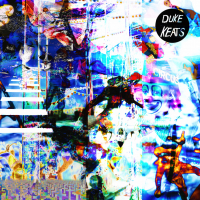"Data Machinery" by Duke Keats
Review
I don't think that Duke Keats is terribly likely to adopt "Expect the Unexpected" as his mission statement, but it would certainly fit snugly.
Firstly, having blindsided all concerned (my included) who were anticipating his new release "Data Machinery" by guerilla-dropping "English Countryside" and "Loan Sharks" last week. Secondly now that the former is almost with us (it arrives tomorrow), as we have all now come to foresee, the song bears little resemblance not only to the latter two but to most else on the road he's trodden before.
Naturally such a cinephile has plenty of diverse inspiration on which to draw which inevitably will affect the resultant music but even so, however broad & inclusive his vision might be, he still requires the chops to implement it: and everything you hear is purely Duke (please do expect those Prince comparisons to keep pouring in) aided by the production skills of long-time collaborator Mason Le Long.
This will in due course join "Heavy Heartbreak" on his eventual ‘Bornstar' EP (he describes the tracklist for this as being "eclectic" which I predict will be something of a laconic understatement by the time I outline the whole EP to you) but I assume the two interlopers into the sequence will remain outside the set.
As we have come to expect, the silver screen played a role in initially inspiring the song as he juxtaposes the perceived glamourous facades (and movie glamour is of course a long-term source of curiosity for him) with the "mundane realities of our lives": which leads him to ponder upon "the repetitive and robotic nature of societal routines".
That linkage of lack of real agency in our lives as technology increasingly shapes what we do and how we do it, accounts neatly for the track's title. However, this is Duke Keats about whom we are talking and there are layers yet to explore. You'd have an interesting song on the above subject, shaping in turn a sound orientated towards the mechanistic to conjure up senses of alienation in the twenty-first century. But then Duke cites the influence of "the vocal arranging techniques of Mary Ford and the pioneering days of multi-track recording" and suddenly we're aware of mid 1950s references (she developed the basic techniques with her husband Les Paul (yes that one) in their garage studio) and suddenly Duke's concerns with "the struggle between creativity and conformity in a structured society" gains a longitudinal context: it's been going on a long while and he predicts that this isn't about to change any time soon.
To that end (presumably), Duke opts for portraying a sense of optimism by palpably displaying that if the question is "is technology a tool for a musician or is it the other way round?" then for him the answer is that he is no slave to the machine. He does this by (with his usual dazzling virtuosity in terms of arrangements and capacity to pull the most complex off) using the obvious electro-robobeat backing as an almost humorously misleading start and then proceeds to parade a range of analogue and organic influences such as Chic or Michael Jackson. In theory this is a tough trick to pull off but he seems to do so effortlessly time after time, melding styles and incorporating his love of previous music into where he sees it going.
The previous single, as per my review, derived from Duke's dream. "Data Machinery" to some extent might be considered a sort of nightmare, but that's a conventional expression in this case: it comes from very real concerns mulled over in his conscious mind. The central dichotomy is not the tension between reality and illusion of our internal processes but between reality of experienced existence and fantasies thrust upon us by external agencies: including the media of fictional content and that of alleged non-fictional "news".
There is a definite sense of acceptance of some form of dystopia, but he feels that it is within our power to fight our way out: if necessary, by blowing up the machine: "we're two sticks of dynamite" as he puts it.
In truth, Duke Keats is setting the music scene on its ears: certainly, he's shifted the baseline of what it might mean to be a music maker in Coventry and Warwickshire and the rest of the country and beyond can only follow in time. Therefore the idea of his contributing to tearing down other accepted shibboleths makes absolute sense.
The paradox (and he is a dealer in paradoxes) is that by ripping the playbook up to create new paradigms, he uses his deep understanding of music & film of the past to analyse where the value lies and reanimate elements long forgotten by the mainstream in order to reincarnate them: opening eyes & ears to what is truthful, always was & will continue to be so: however buried it might have got under the detritus of the ephemeral and commercially homogenous.









